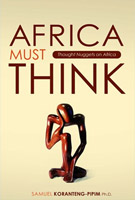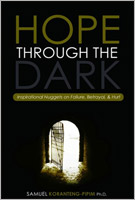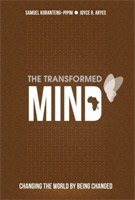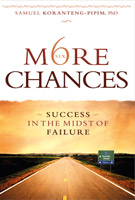I. THE NATURE OF THE CONFERENCE
The Africa Arise event in Rwanda consists of:
(i) Daytime conferences/seminars (9:00am-12:30pm) for some 500-750 registered thought leaders, teachers, and pastors. Under the broad theme of “The 7 Mountains,” each year’s conference focuses on seven spheres of African society—namely, Leadership & Governance, Education, Arts & Entertainment, Media, Economy, Family, and Religion. Conferences/seminars such as these affords us the opportunity to influence the influencers of African society.
(ii) Besides the daytime seminars, there are also the evening “summits” (4:00pm-7:30pm), that are open to the general public (average attendance is about 10,000). The evening summit consists of cultural displays, drama and dance, inspirational messages, music, and sermons.
II. MY SPECIFIC ASSIGNMENT
I was invited to speak on “The Mountains” of Education, Religion, & Youth Empowerment & Leadership. The specific topics assigned me were:
Day 1. “Effects of Education Without Values in Africa”
Day 2. “Demonstrating How the Clergy Can Preserve the Biblical Truths.”
Day 3. “Mentorship as a Vehicle for Promoting Values Among the Youth in Africa.”
Day 4. “Why/How Should We Instill a Culture of Reading and Writing Among Africans?”
Day 5. "Youth Special – Challenging Young Africans About their Role in the Marketplace”—Panel Discussion
In addition to the above seminars for the thought leaders, teachers and pastors of various Christian denominations, I was also privileged to be the divine-service speaker on Sunday, July 15, at the 1st service of the host church (Zion Temple Church, a Pentecostal Assembly of some 5,000 members).
III. WHAT WAS ACCOMPLISHED?
Although I was invited in my professional capacity as a leadership trainer, advocate for excellence and youth empowerment, and Christian Pan-Africanist, the Lord used my presentations to influence mindsets on biblical teaching. So impactful were the seminar presentations that, about half way through the conference (i.e., after my first three seminar presentations), three new assignments were added to:
— (i) Give the final/closing Africa Arise evening message to an audience that swelled to about 12,000.
— (ii) Address the youths, students, and young professionals on Monday, July 16—a day after the conference officially ended. (Some 2,000 youth showed up.)
— (iii) Speak on the nature and purpose of true education on Tuesday, July 17 to a group of 50+ Christian teachers who had attended earlier seminars—an assignment that gave me opportunity to articulate the wholistic concept of education aptly captured in the opening paragraph of EGW’s insightful book “Education.” The pregnant paragraph reads:
“Our ideas of education take too narrow and too low a range. There is need of a broader scope, a higher aim. True education means more than the pursual of a certain course of study. It means more than a preparation for the life that now is. It has to do with the whole being, and with the whole period of existence possible to man. It is the harmonious development of the physical, the mental, and the spiritual powers. It prepares the student for the joy of service in this world and for the higher joy of wider service in the world to come” (EGW, Education, p. 13)
— (iv) These three new assignments were besides the impactful conversations I had with some of the key leaders and Christians who sought private audience with me to discuss biblical and contemporary issues of relevance to Africans. (There was also the opportunity of sharing relevant literature on a wide variety of themes).
IV. OTHER HIGHLIGHTS
While in Rwanda for the Africa Haguruka Conference, I engaged in other activities. For example,
— (a) I spent my Sabbath (Friday evening and Saturday) with the Kigali English Seventh-day Adventist Church, where I addressed the Adventist Men’s Organization (AMO) Sabbath.
— (b) I was graciously and warmly hosted for lunch by one of the leaders of AMO (courtesy of his affable and cheerful Christian wife). After the meal, I spent the afternoon answering some of her biblical questions. The visit to their home was definitely one of the highlights of my recent trip to Rwanda.
— (c) On Monday morning, July 16, a day after Africa Arise officially ended, I visited the Ntarama Genocide Memorial Center, which is an hour's drive south of Kigali. Ntarama's former Catholic church is where some 5,000 people were massacred on 15 April 1994 during the Rwanda Genocide. Today that church is a genocide memorial center, one of six major centers in the country that commemorate the Rwanda Genocide. (The others are at Murambi, Kigali, Nyamata, Bisesero, and Nyarubuye.).
Visiting the Ntarama Genocide Memorial Center was a sobering experience. I got to see with my own eyes another evidence of the evil in the human heart that could fully display itself in acts of inhumanity against fellow human beings.
V. HOPE FOR THE FUTURE
If the genocide was the most ugly part of Rwanda’s history, perhaps one of the best illustrations of its hopeful future is displayed at a model retirement home for the elderly survivors of the genocide. I had the privilege of visiting one of such homes in the town of Nyamata in the Bugesera district. On July 3, 2018, barely two weeks before my visit, Rwanda’s First Lady, Jeannette Kagame inaugurated the facility to accommodate about 80 elderly widows and widowers whose families were completely wiped out during the 1994 Genocide against the Tutsi.
The Nyamata retirement home (rare in Africa) is one of many such facilities across the country that had been opened to take care of some of the most vulnerable in Rwandan society The beautiful, multi-million complex features a health post, counseling center, and a multipurpose hall among other components to generate income. This income would then be plowed back to cater for day-to-day running of the hostel. (Some of the other homes engage in income-generating activities, such as business projects, farming, basket-weaving and other handicraft. And garments produced on modern tailoring machines are now marketed worldwide.)
The retirement home facility is one of the many home-grown initiatives by the nation of Rwanda to rebuild after the trauma and consequences of genocide—which include poverty, displacements, HIV, and many other issues. Many old people lost literally everything, resulting in some of them being homeless. The nation also lost its talented people, including many of its intellectuals, its hospitals, schools, and many other things.
But through visionary, courageous, and selfless leadership, the current government of Rwanda has provided a vision of a hopeful future. It has banned any form of discrimination by ethnicity, race or religion. It has created a climate in which citizens are taking ownership of their own destiny. It has opened up innovative ventures in business and technology that are transforming Rwanda into an economic giant and the hub of economic renaissance on the continent. And it has instilled a new mindset, discipline, and personal responsibility that has made the country the safest and cleanest on the continent.
But if the progress of a nation should be judged by how it cares for its most vulnerable, then through its retirement home facilities for widows and widowers, Rwanda—the nation that is rising from the ashes of ugly genocide—offers the most beautiful vision for what African countries can be. The annual Africa Haguruka conferences and summits are an attempt to add its voice in offering this hope and dignity for the continent.
Through its unique ministry of “influencing the influencers” (
https://tinyurl.com/yae274jr), EAGLESonline is privileged to play a small part in this movement of transformational change in African society. But as I explained to the youth in my last major address before leaving Rwanda, in seeking to advance transformational change in society, we must ever remember that this world is not our home. We are
“strangers and pilgrims on the earth….We [should] desire a better, that is, a heavenly country… which has foundations, whose builder and maker is God” (Hebrews 11:13-16; 10).
“For our citizenship is in heaven, from which we also eagerly wait for the Savior, the Lord Jesus Christ, 21 who will transform our lowly body that it may be conformed to His glorious body, according to the working by which He is able even to subdue all things to Himself” (Philippians 3:19, 20).
Rwanda was a blessing. And many more places beckon for biblical messages of hope and needed change. It's why we will keep doing our part to help rebuild hope and inspire transformational change in heart and deeds by voice and pen.
I ask that you keep EAGLESonline and its partners in this unique ministry of “influencing the influencers” in your continued prayers.
“Those who belong to the higher ranks of society are to be sought out with tender affection and brotherly regard. Men in business life, in high positions of trust, men with large inventive faculties and scientific insight, men of genius, teachers of the gospel whose minds have not been called to the special truths for this time--these should be the first to hear the call. To them the invitation must be given….Those who stand high in the world for their education, wealth, or calling, are seldom addressed personally in regard to the interests of the soul. Many Christian workers hesitate to approach these classes. But this should not be.” (Christ’s Object Lessons, p. 230; emphasis mine).
—Samuel Koranteng-Pipim, PhD
July 19, 2018









